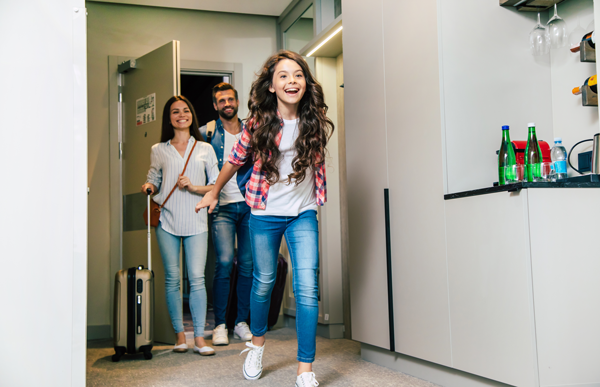Traveling by car when a family member has food allergies can be a success with careful planning. Once you make your vacation plans, you can have a lot of fun and stay safe on the road. Here are eight tips to get you started when you’re planning your next road trip.
1. Plan your meals before you leave home.
Planning your meals ahead of time can save you a lot of stress in the long run. Make a list of heat-and-serve or ready-to-eat snacks or meals you can eat on the road.
Also, look at your trip route to see what foods you can buy along the way. Make note of restaurants and grocery stores that are likely to have foods your child can eat. Then decide what you can buy at your destination or along the way. Research what is available at your vacation spot if you need to pack light.
Here are some ways you can research allergy-friendly restaurants:
- Read reviews on crowdsourcing sites and apps such as Allergy Eats and Find Me Gluten Free.
- Look for restaurant chains with allergy-friendly policies. Allergy Eats publishes lists of the some of the most allergy-friendly restaurants.
- Check out restaurant websites to see if they publish menus and allergy policies.
- Call restaurants in advance to find out if they can accommodate your child’s food allergies. Call during slow times and ask to speak to the general manager or kitchen manager if possible.
Take all this information and research to create a meal plan for each day of the trip.
2. Keep cold foods cold.
Bring a cooler or a portable refrigerator that plugs into your car to keep fresh food cold while you travel. Don’t forget to include zip-top bags of ice or reusable ice packs. You can also pack a portable cooler bag to take snacks with you during activities at your destination.
3. Look for hotel rooms with microwaves and refrigerators or a kitchenette.
Rooms with microwaves and refrigerators are useful if you plan to reheat foods or cook in the hotel room. They come standard in many hotel rooms now. Some hotels may even have rooms with kitchenettes available.
If each room does not have a microwave and refrigerator, many hotels will have a few for rent. Call ahead to find out if a microwave and fridge are available. Tell hotel management you need them for medical reasons. That may put you at the top of the list for availability. The hotel may waive rental fees if you bring a letter of medical necessity from your doctor.

4. Think small.
When you purchase food, try to get as many individually packaged foods as possible. For instance, use your limited refrigerator space to store juice boxes instead of a big bottle of juice. Smaller packages are also easier to take sightseeing. And if you have any leftovers, they are easier to transport home.
5. Shop locally.
Remember that grocery stores are almost everywhere. Bring less perishable food than you think you will need. Instead, bring more non-perishable food than you think you need. You can buy many perishable foods, like fresh fruit, at any standard grocery store. If you created a meal plan like we mentioned in tip #1, create a grocery list using your plan with a list of foods you can buy when you get to where you’re going.
Specialty items, such as wheat-free cookies or your favorite allergen-free brands, may not be available at a regular grocery store. Bring those allergen-free foods that you know are safe and that your child is familiar with eating.
6. Ship ahead.
If you won’t have time to shop when you get to your destination, consider ordering food you will need online or locally. Have the items shipped to your hotel.

7. Don’t forget the dishes.
Bring a small set of dishes, silverware, and kitchen utensils (if you plan to cook). Look at your meal plan to figure out what you’ll need. Pack light – just a few items will do.
8. Bring your medicines and your emergency plans.
Be sure to check expiration dates on epinephrine auto-injectors. Before you leave, practice with an auto-injector trainer and review your child’s emergency plan away from home.
Consider bringing extra medicine in case of an emergency. Inhaled medicines, such as asthma inhalers and nebulizer fluid, tend run out unexpectedly. A duplicate can be a lifesaver.
When traveling, make sure your child's medicines are in their original containers with the prescription labels on the package.
You don’t have to manage your child’s food allergies alone. KFA provides educational information, food allergy news, a collection of nearly 1,500 Safe Eats® recipes, and new allergy-friendly food alerts. We also have discussion forums where you can talk with other parents and caregivers managing food allergies in a safe, encouraging environment.












Comments (0)